The world’s busiest shipping lanes
Occam’s Razor
The simplest explanation is usually the simplest. There is no need to develop many theories (the plurality of) if a simple one suffices. When two explanations are given to a question, the simpler of the two is usually the correct one. This is because we make judgements based on empirical (senses) evidence. This is Occam’s Razor or the Law of Parsimony. By adhering to this philosophical theory, William Occam would argue that you save both time and effort.
For example,
- if a murder takes place police should look towards a family member or someone known to the victim first. The records indicate that the killer usually knows the victim, also usually male, so this is the simplest solution. ‘54.3 percent were killed by someone they knew (acquaintance, neighbor, friend, boyfriend, etc.); 24.8 percent of victims were slain by family members.’ FBI, 2011
- if you are religious, events can be explained by their gods. Jesus walked on water and this can be explained simply by Christians because he was the son of God.
- when the First World War ended, the blame was placed onto Germany. They were seen to have started the conflict, invading Belgium and then France, so they must be held responsible. It was the simplest solution, and this theory still holds weight today.
However, skeptics use Occam’s Razor for a different purpose. It allows them to consider other explanations. Moreover, there is no evidence that simplicity means accuracy or truth.
- if you are an atheist, events cannot be explained by a deity’s actions or thoughts, and scriptures can be critiqued for their reliability.
- the countries which are affected by Covid-19 pandemic the worst are those whose political leadership are poor. But there could be a myriad of other reasons why and, as yet, the crisis is not over so the years ahead may give us more qualified answers.
Do Maps Lie?
One assumes that a map is accurate. There is no reason to alter a map after all. But nothing is straight-forward so unfortunately maps are not accurate. Just watch the following video to see how continents and countries are not what size you think they are. Which do you think is the biggest error?
This is the traditional world map.
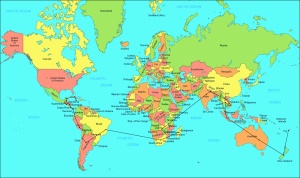
Or is it?
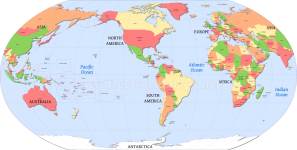
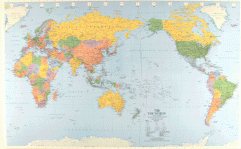
The first map was obviously produced by Europeans. They ‘discovered’ the world when they were building empires from the 15th to the 20th centuries. This may explain why Britain’s size is exaggerated on maps, Europe too. Africa is always far smaller on world maps. Why do you think this is the case?
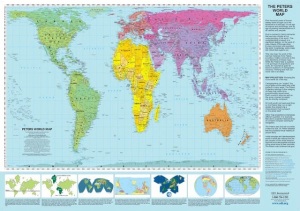
And finally, ever wondered why so many people speak English?
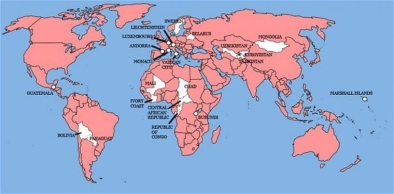
Do you know the countries of the world? Try the following quiz.
Grade 11 2020-21
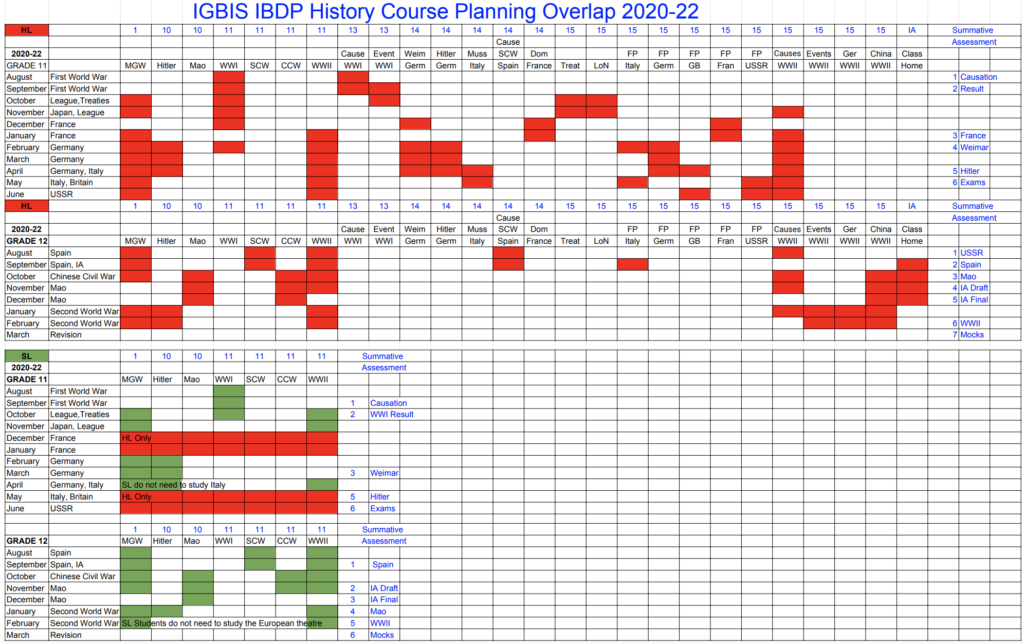
Both sides of the story
Every news story has an element of bias within it, intentional or not. To see a different perspective, use the following website. It gives you some of the main news stories of the day but from different, usually, political angles.
If you could go back in time…
If you were able to go to China in 1949, Russia in 1917 or the USA in 1965 and give advice to powerful people who lived there, what would you say? How would you prepare them for Chairman Mao, the rule of Lenin or the start of the Vietnam War? To give you an idea of how this may happen, watch how this lady goes ‘back in time’ to prepare ‘herself’ for the Coronavirus.
Documentaries for IBDP History Learning
Move to Global War
War of the World – Niall Ferguson
Authoritarian States
The Nazis, A Warning from History
Twentieth-Century Wars
Battle for Moscow – WWII
Europe and the First World War
Blood and Oil, WWI and the Middle East
Interwar Years
The remainder of this series is on YouTube. There are another eight episodes which you could watch for most of the DP History course.
Diplomacy in Europe
Movies to Teach History
Movies can be entertaining but to historians, they can be much more. They can reflect the public mood of the country, politically, socially or economically. So I recommend you try to answer the following questions:
- How historically accurate is the movie? I have given a link for each so you can answer this. However, remember that all reviews are subjective.
- What could be the impact on popular culture of the film? What narrative of the event is being told?
- Does the director/producer have an agenda? What is it?
- How valuable is the source to learning history?
A. All Quiet on the Western Front (1930). First World War, Western Front – Accuracy
B. Schindler’s List (1993). Second World War & The Holocaust – Accuracy
C. Band of Brothers (2001). Second World War, Western Front – Accuracy
D. Saving Private Ryan (1998). Second World War, Normandy – Accuracy
E. The Imitation Game (2015). Second World War, codebreaking – Accuracy
F. The Darkest Hour (2017). Second World War, Britain – Accuracy
G. The Rise of Evil (2003). Hitler – Accuracy
H – The Great Escape (1963). Second World War, POWs – Accuracy
I – Paris 1919. Treaty of Versailles – Accuracy
J – The Lost Battalion (2001). First World War, US involvement – Accuracy
K – Stalingrad (1993). Second World War, German perspective – Accuracy?
L – Enemy at the Gates (2001). Second World War, Battle of Stalingrad – Accuracy
K – Valkrie (2008). Opposition to Hitler – Accuracy
L – Bridge over the River Kwai (1957) – Second World War, Asia – Accuracy
M – Jojo Rabbit (2019). Hitler’s Germany – Accuracy
N – The Book Thief (2014). Hitler’s Germany – Accuracy
O – Downfall (2004). Hitler’s Germany – Accuracy
P – Tora, Tora, Tora (1970). Second World War, Pearl Harbor – Accuracy
Q – Max Manus, Man of War (2008). Second World War, Norway – Accuracy
R – Judgement at Nuremburg (1961). Post-Second World War, Nuremberg Trials – Accuracy
S – Conspiracy (2001). Second World War, The Holocaust – Accuracy
T – Sophie Scholl (2005). Nazi Germany – Accuracy
U – 1917 (2019). First World War, Western Front – Accuracy
V – Dunkirk (2017). Second World War, Western Front – Accuracy
W – Lawrence of Arabia (1962). First World War, Middle East – Accuracy
X – Das Boot (1981). Second World War, U-Boats – Accuracy
Y – Battle of Britain (1969). Second World War, Britain – Accuracy
Z -37 Days (2014). Causes of the First World War – Accuracy
There are many more movies to analyse, especially regarding Asian politics and conflict. As I have only seen a few, which are all English-language, I cannot advocate watching any which I have yet to see (I am aiming to watch the Chinese Jian guo da ye film very soon). However, if you have any recommendations, feel free to make a comment. Finally, I would add that the following are so far-fetched that you should not watch!
- Pearl Harbor (2001)
- Midway (2019)
Research Questions
What is a research question?
A research question is a clear, focused, concise, complex and arguable question that links to your research or topic. You should ask a question about an issue that you are genuinely interested in. It is important that a balanced argument can be developed as part of the answer.
Why is a research question essential to the investigation?
Research questions help writers focus their research and their analysis. You want a narrow and specific question, allowing for a more effective thesis (this is your argument or judgement), and for an answer to be completed within the confines of the task.
Steps to developing a research question:
Writers should choose a topic about which they genuinely would like to know more. For the French Revolution, this could be comparing some of the causes which interest you.
Consider your audience.
For most papers, your audience will be your teacher, but always keep your audience in mind when narrowing your topic and developing your question. Would that particular audience be interested in this question?
Start asking questions.
Taking into consideration all of the above, start asking yourself open-ended “how” and “why” questions about your general topic. For example, if you were focusing on the impact of the Stamp Act, you may ask other questions such as ‘Who did it impact the most?’ and ‘Who gained from the Stamp Act?’ Ensure you use a command word in your research question. A full list for I&S is here
Evaluate your question.
Is your research question clear? With so much research available on any given topic, research questions must be as clear as possible in order to be effective in helping the writer direct his or her research.
Is your research question focused? Research questions must be specific enough to be well covered in the time and space available.
Is your research question complex? Research questions should not be answerable with a simple “yes” or “no” or by easily-found facts. They should, instead, require both research and analysis on the part of the writer.
Sample Research Questions
Unclear: Why are social networking sites harmful?
Clear: How are online users experiencing or addressing privacy issues on such social
networking sites as Facebook?
Unclear: How does a transnational corporation change a country?
Clear: Evaluate how a transnational corporation changes its strategy when operating in a MIC or LIC.
Since 2010, discuss whether transnational corporations operate ethically in a MIC or LIC?
A good piece of advice is that if Google can answer your research question, it is not creative or focused enough.
